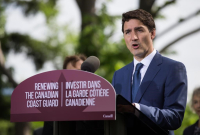Support strong Canadian climate journalism for 2025
An Ontario shipyard has dropped a request for an investigation into whether the federal government tried to rig its plan to add a third yard to its multibillion-dollar shipbuilding strategy in favour of Quebec rival Chantier Davie.
The move by Hamilton-based Heddle Marine comes only a few weeks after the government invoked a controversial national-security exception that prevents such investigations by the Canadian International Trade Tribunal.
The tribunal's role is to ensure the government follows proper procurement rules, including adhering to Canada's obligations under international trade law and free-trade agreements.
In an interview, Heddle Marine president Shaun Padulo said his company decided to drop its complaint after lawyers determined there was no point in continuing after the exception was invoked.
The tribunal was still formulating an official response to the government's use of the exception, which the Liberal government quietly expanded over the summer without any consultation with industry or experts.
"What we were advised is that based on the law, that national-security exception, there's nothing that we could really do to fight it," Padulo told The Canadian Press.
"They said that this would not be a fight that we could win and it would not accomplish anything to protest the national-security exception. So our best bet is to wait to see what the government's next steps are."
The federal government launched its high-stakes search for a third yard to join Halifax's Irving Shipbuilding and Seaspan Marine in Vancouver in Canada's so-called national shipbuilding strategy in August.
The winning yard could be awarded billions of dollars in work associated with building at least six new icebreakers for the Canadian Coast Guard and stands to gain much more in future work as well.
Heddle alleged in its complaint that many of the requirements the government said shipyards must meet to qualify for consideration were not legitimate or reasonable — and would disqualify virtually every yard but Davie, which is across the St. Lawrence River from Quebec City.
The federal procurement department subsequently amended some of the requirements, but Heddle asked the tribunal to press ahead with its probe.
It was at that point that the government invoked the national-security exception. In June, the government had rewritten regulations so it could invoke the exception without having to give a justification.
That change came without warning or consultation with industry — and despite previous concerns from the tribunal about an excessive use of such exemptions as well as requests the government limit their use.
While the government did not lay out to the tribunal why the exception was invoked in this case, Fisheries and Oceans Canada spokeswoman Ashley Jackson said it was to ensure the protection of Canada's "national-security interests."
"The ships will be used for a wide variety of security-related work such as supporting law-enforcement activities, national and international fisheries patrols, Arctic sovereignty, and maritime-domain awareness," Jackson said.
"In the past, the coast guard has applied the national-security exception to the projects acquiring the polar icebreaker, medium icebreakers and helicopters."
Heddle's complaint aside, the changes to the exception should be a concern to all Canadians given how much the government spends on goods and services each year, said Christopher McLeod, the head of commercial litigation at Mann Lawyers in Ottawa.
"Having an open, fair and transparent system for the government to procure those goods and services is fundamentally important," said McLeod, who successfully challenged the exception in a previous case in 2016.
That challenge prompted the trade tribunal to begin more closely scrutinizing the government's reasons for invoking the exception — until the new rules came in saying the government doesn't have to give any.
"The regulations introduced this summer are a giant step backwards when it comes to fairness, openness and transparency," McLeod said.
"It's not like the federal government is simply ignoring a loophole that allows unfairness, they have actually gone back and re-opened a loophole that the (trade tribunal) has previously tried to close."
This report by The Canadian Press was first published Sept. 24, 2019.




Comments